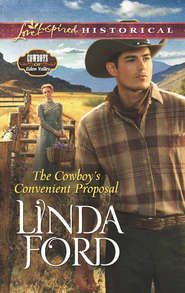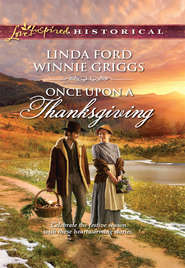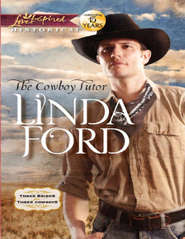По всем вопросам обращайтесь на: info@litportal.ru
(©) 2003-2025.
✖
The Road to Love
Настройки чтения
Размер шрифта
Высота строк
Поля
He continued. “Makes it hard for a man to stay warm in the cold. Doubly hard to cook a thick stew even if a man had the makings.”
Kate knew the feeling of unrelenting cold, hunkering over a reluctant fire, aching for something warm and filling to eat. Seemed no matter how long she lived she’d never get over that lost, lonely feeling. It was this remembrance that made her ease her way down the ladder.
She sighed heavily when her feet hit solid ground.
Shep pressed to her side.
Grateful for the dog’s protection, she patted his head to calm him, and glanced about for her children.
Dougie bounced around the stranger, boldly curious while Mary had retreated to the shadow of the chicken house. Knowing how much Mary hated and feared the chickens, her choice of safety seemed ironic.
Kate faced the man.
He was taller than he looked from above, bigger, and lean to the point of thinness, his black hair shaggy and overly long, his skin leathered and brown from living outdoors, his eyes so dark she couldn’t see the pupils.
But she liked the patient expression of his face. He looked the sort of man who would be unruffled by adversity. She mentally smiled. A roving man no doubt had his share of such.
His clothes were threadbare but clean.
It said a lot for a man that he managed to look decent under his present circumstances. And what it said made her relax slightly.
The tramp rolled a soiled cowboy hat in his fingers, waiting for her to complete her study of him. Suddenly, he tossed the hat on the ground and reached for the bucket of grease.
At first she didn’t release the handle. She would have to do this job sooner or later. Then she let him take the bucket. Later suited her just fine.
He scurried up the windmill with the agility of a cat.
Kate watched his progress, squinting against the bright sun. Her chest tightened as he stepped to the platform and the wind tossed his hair. She shuddered when she realized he didn’t hang on. She pulled her gaze from the man and grabbed Dougie’s arm, putting an end to the way he bounced up and down at the ladder, trying to reach the first rung.
“Come on, the man is going to want to eat when he’s done.” If she didn’t provide a decent meal he would no doubt leave one of those hobo signs at the gate indicating this farm provided mean fare. Why should she care? But she did. She still had her pride.
“Mary, come on. I need your help.” Mary shrank back while Dougie tried to pull from her grasp. Seemed to be the way she always stood with them—holding Dougie back, urging Mary on.
She’d planned bread and fried eggs for them. Now she had to scrape together something for a regular meal. And she still needed to milk the cows, separate the milk, set bread to rise, a hundred other little tasks beyond measuring or remembering.
“Come, Mary.” Her words were sharp. She sounded unforgiving. But she didn’t have time to coddle the child.
Mary jerked away from the building and raced to her side.
As Kate shepherded both children to the house, she mentally scoured the cupboards for what to feed the man.
“Dougie, get me some potatoes.” As she tugged off the coveralls and hung them on a hook, he hurried away, eager for the adventure of the dark cellar.
Kate smoothed her faded blue cotton dress. “Mary, bring me a jar of canned beef and one of green beans.” Mary went without crying only because Dougie traipsed ahead of her.
Kate poured a cup of raisins into a pot and covered them with water to boil then scooped out a generous amount of her homemade butter and measured out half a cup of her precious sugar. She added the softened raisins, flour and spices then put the cake in the oven while the children did as she said.
Dougie brought back a basin full of potatoes, wizened and sprouted after a winter in storage.
Not much, but still she was grateful she had food for her children. She peeled the potatoes as thinly as possible so as not to waste a bit and set them to boil. She gathered the peelings in a basin to later take to the chickens.
Dougie watched out the window, giving a step-by-step description of what the man did. “He greased it. He’s climbing down. Sure isn’t scared like you are, Momma. He put the grease pail on the ground. He’s watering the cows.” The boy dashed out of the house.
“Dougie, wait.” The skin on the back of Kate’s neck tingled as she hurried to the door. She couldn’t trust her child with a stranger.
Dougie raced to the man, spoke with him a minute and ran back to her. “Momma, his name is Hatcher. He says he’ll milk the cows.”
Hatcher? Sounded too much like hatchet for her liking. Was it his nickname? Earned by the deeds he did? She didn’t like to judge a man prematurely but she’d sooner be overly cautious than have someone named Hatcher hanging around. “No. I’ll do it,” she said.
But Dougie grabbed the galvanized tin buckets and headed back outside before she could stop him. He rejoined the man who took the pails but stood watching Kate, waiting silently for her agreement.
Again she felt his quiet patience. Jeremiah had been like that. Slowly, she nodded, and her son and the man disappeared into the barn.
Suddenly a whole stream of worries assailed her. Was she foolish to let her son out of sight with a tramp? On top of that, she wondered if the man knew how to milk properly. Would she have to go out and strip the cows? She couldn’t let them go dry. The milk fed herself, the children, the pig and the chickens. Besides providing their butter, the cream gave them the only cash they would have until the crop was seeded, and harvested. And that depended on having rain when they needed it, no grasshoppers to eat the crop and a hundred other things. “It’s in God’s hands,” she whispered. “He’ll take care of us. He’s promised.” She forced herself to dwell on these comforting words yet threads of concern knitted around the promise.
She stood in the doorway, torn between hurrying out to the barn and the need to prepare the meal. The cake was almost ready to come out. If she left it now, they’d have burned sacrifices for supper.
“Mary, sit on the step and watch the barn.”
“What for, Momma?”
“Just watch it and let me know if anyone comes out.” She shoved her daughter outside, ignoring the stark fear in her eyes. “All you do is sit here. I have to finish supper.”
She tested the cake, put it back in the oven, pushed the boiling potatoes to a cooler spot on the stove and emptied the meat and beans into pots to heat.
Mary clattered inside. “Momma,” she whispered.
“Ma’am?”
The deep voice, unexpected as it was, startled Kate. She jerked her gaze to the man standing in her doorway, two foamy pails of milk in his hands.
Dougie raced in behind the man.
Kate let her tense chest muscles relax knowing the boy was safe and sound.
The man carefully avoided looking at her as he set the pails on the worn wooden table next to the door and retreated.
“Supper is ready,” she told him. “Make yourself comfortable while I dish you up a plate.” She nodded to the step indicating he should wait there. When Dougie prepared to join the man, Kate called him inside. He reluctantly slouched indoors.
Kate dished up generous portions of food and carried the plate to the man.
He nodded. “Thank you, ma’am. Name’s Hatcher Jones.”
Kate hesitated then gave her name. “I appreciate your help, Mr. Jones. I’ll bring you dessert in a few minutes.” She ducked back inside, closed the door behind her, served the children and herself, all the time aware of Hatcher Jones on the other side of the solid wooden door. It made her feel awkward to sit at the table while he sat on the step, yet nothing in the world would persuade her to invite him inside the house. Most hobos were ordinary men on the move looking for work wherever they could find it but even without Mary’s frightened look she became acutely conscious of the vulnerability of her two children.
Mary and Dougie finished and Kate deemed the cake cool enough to cut. She put a generous slice in a bowl, poured on thick, cool cream and took it outside.
Hatcher Jones handed her his spit-clean plate and took the bowl of dessert, his eyes appreciating the food as he murmured his thanks.











